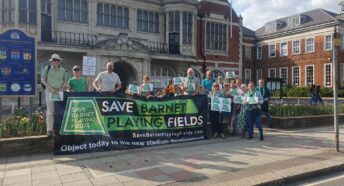Cleve Hill solar farm plan: if you want to have a say, now is the time to register

The Planning Inspectorate last week agreed to consider proposals for the UK’s largest solar farm, on the North Kent Marshes near Faversham – and you can comment on the scheme.
Cleve Hill Solar Park Ltd’s application for a Development Consent Order that would allow it to build a 1,000-acre solar power station was accepted by the Planning Inspectorate, meaning there will now be a consultation period leading into an inquiry.
If you want to have your say on the planned Cleve Hill Solar Park, you need to register as an Interested Party – and today (Wednesday, December 19) the window for registration opened.
Your views must initially be registered in no more than 500 words by Monday, January 28.
Registration does not commit you to anything. However, if you later wish to become involved and make representation to the inquiry inspector, you must have registered during this period.
To go to the registration form, click here
This will also take you to a tab letting you view the application documents. You might, however, find them easier to navigate via Cleve Hill Solar Park Ltd’s website here (due to the size of the files, they are uploaded on a Google Drive space).
CPRE Kent will of course be registering as an Interested Party. Our final draft is yet to be completed, but we expect it to include the following concerns:
- Damage to landscape, including tranquillity and dark skies
- Inadequate assessment of flood risk and potential conflict with the Environment Agency’s ‘managed retreat’ strategy relating to future sea-level rise
- Impacts on soil microclimate and hydrology
- Ecological impacts and loss of biodiversity
- Damage to heritage assets caused by traffic during construction and beyond the construction period
- Loss of agricultural land
- Threats to animal welfare
We expect to work alongside a range of groups, so if you wish to make comments via CPRE Kent please email either:
You can, of course, register as an individual to be involved in the examination of the DCO.
For more on the saga of Cleve Hill, see here and here
Wednesday, December 19, 2018
- A number of important documents have yet to emerge. For example, a rigorous transport plan and a finalised air-quality assessment. The latter is critical given that allocations at Teynham will feed extra traffic into AQMAs.
- There seems to be no coherent plan for infrastructure delivery – a key component of the plan given the allocations being proposed near the already crowded Junction 7.
- There seems to have been little or no cooperation with neighbouring boroughs or even parish councils within Swale itself.
The removal of a second consultation might have been understandable if this final version of the plan were similar to that being talked about at the beginning of the consultation process. It is, however, radically different in the following ways:
- There has been a major shift in the balance of housing allocations, away from the west of the borough over to the east, especially around the historic town of Faversham. This is a move that raises many concerns.
- A new large allocation, with accompanying A2 bypass, has appeared around Teynham and Lynsted, to which we are objecting.
- Housing allocations in the AONB around Neames Forstal that were judged “unsuitable” by the council’s own officers have now appeared as part of the housing numbers.
- Most of the housing allocations being proposed are on greenfield sites, many of them on Grade 1 agricultural land – a point to which we are strongly objecting.
Concerns about the rush to submit the plan
The haste with which the plan is being prepared is especially worrying given the concentration of housing in Faversham. If the town is to take a large amount of new housing, it is imperative that the policies concerning the area are carefully worked out to preserve, as far as possible, the unique nature of the town. The rush to submit the plan is likely to prove detrimental.
As Swale does not have a five-year land housing supply, it is open to speculative development proposals, many of which would run counter to the ideas contained in the current plan. Some are already appearing. This is a common situation, and one that, doubtless, is a reason behind Swale’s haste.
Our overriding fear, however, is that this emphasis on haste is ultimately going to prove counterproductive. This is because it is our view that the plan, in its current form, is unlikely to pass independent examination. We are urging Swale to listen to and act upon the comments being made about the plan and to return the plan to the council with appropriate modifications before submitting it to the Secretary of State.
Essentially, this means treating the current consultation not as the final one but as the ‘lost’ second consultation.
The consultation ends on Friday 30 April and we strongly urge residents to make their opinions known if they have not already done so.
Further information








